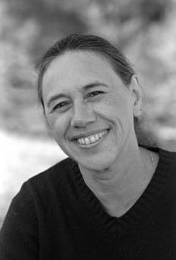Theresa Marquez, Chief Marketing Executive for Organic Valley Cooperative, is captivating. She speaks quickly, compellingly, and passionately. Her eyes shine when she mentions a favorite book or describes the Earth Dinners Organic Valley has hosted for several years around the country, connecting people to both food and the environment. An hour with Theresa can include a poem, a discussion of politics, a newspaper article throw-down (Paul Krugman’s “Missing Richard Nixon”), a look at Organic Valley’s new packaging, and - of course - a discussion about food. In yesterday’s post, I wrote about my time with Theresa last month, about Agriculture of the Middle, and about how Organic Valley perceives their role in the food system. Today, Theresa takes on corporate greed and big agriculture.
“We’ve got major problems that we can’t solve alone,” Theresa tells me. “And if you want proof of how broken the food system is, by 2030 things are going to get a lot worse. 85% of our kids will be obese. One in three kids will have diabetes, and if you’re black or Latino, it will be one in two.
“Climate change… if we’re going to fix these things, it’s going to be by working together. We as a human race have the solution to our problems and we know how to fix them. We know about methane. But personal greed gets in the way.
“We have to decide if it’s better to curb global warming and go into a recession [for the good of the whole] or if it’s better to feed Wall Street and ignore global warming because it’s eating into our profits.”
Although she runs marketing for a $500 million+ organization, I’m not surprised that Theresa feels this way. Truth be told, though, it’s thrilling to hear the words come from the mouth of a successful food executive in this country.
 “We know that high pesticides cause low IQs,” Theresa continues, “and that kids eat shitty food before they go to school and try to learn. As a culture, we need cooperation to fix these things.”
“We know that high pesticides cause low IQs,” Theresa continues, “and that kids eat shitty food before they go to school and try to learn. As a culture, we need cooperation to fix these things.”
What about Organic Valley? I want to know. Is the collaborative co-op system the answer to our problems?
“I don’t know if we [Organic Valley] have it right. We’re a social experiment disguised as a business. We’re still trying to figure out how to run a business as a co-op. It’s hard! We have to educate farmers on what the issues are, and they’re supposed to be out farming.
“But the big guys, they don’t want to change,” Theresa says, “it part of the dumbing down of Americans. We’re into the ‘precautionary principle,’ [the idea that the burden of proof lies with those who want to stop potential risks from entering our system, rather than with those who introduce them]. The FDA will never say that something’s safe. They’ll say, ‘we’ve assessed the risk and we think the risk is minimal.’ So science is on their side.”
Those of us who think about real, whole foods are more likely to follow something I’ll call the “Pollan principle”: if our gut tells us that a product is not real food, it probably isn’t. No amount of FDA promises can convince us that a Twinkie is good, or that a Big Mac can be called food. The only thing we need the FDA to tell us about these “edible food-like substances” is how bad they are. Will they kill us immediately, or not for a few years?
“I started thinking about organic food in 1978,” Theresa says, “my first job was at a natural food co-op in Portland. We used to say to people, ‘do you want to eat that food? do you want to be a lab rat?' Well, guess what? We are.”




